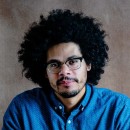Geffrey Davis
Poetry

- Biography
Biography
Geffrey Davis is the author of three books of poems, most recently One Wild Word Away (BOA Editions 2024). His second collection, Night Angler, won the James Laughlin Award from the Academy of American Poets; and his debut, Revising the Storm, received the A. Poulin, Jr. Poetry Prize and was a Hurston/Wright Legacy Award Finalist. His writing has been published in places such as AGNI, The Atlantic, New England Review, The New York Times Magazine, The New Yorker, Orion Magazine, Oxford American, PBS NewsHour, Ploughshares, and Poetry Northwest. A recipient of the Anne Halley Poetry Prize, the Dogwood Prize in Poetry, the Porter Fund Literary Prize, a Pushcart Prize, and the Wabash Prize for Poetry, Davis has also been awarded fellowships from Bread Loaf, Cave Canem, the National Endowment for the Arts, the Vermont Studio Center, and the Whiting Foundation for his involvement with The Prison Story Project, which strives to empower incarcerated women and men to tell their own stories through writing. Davis currently lives in the Ozarks, where he teaches for the Program in Creative Writing & Translation at the University of Arkansas. Raised by the Pacific Northwest, he also serves as Poetry Editor for Iron Horse Literary Review.
Mentor. Workshops and classes in poetry.
Statement: I encourage writers to keep sight of what comes next. Yes, we will work on sharpening our craft through intensive practice with technique and through a study of prosody that is grounded in the synergetic relationship between reading and creativity. But the art of writing (like thinking) is an ongoing and lived engagement with how our voices and our hands shape and get shaped by the world. That engagement should evolve and thrive beyond the particulars of any single learning context. As such, I think of workshop as an interim where we cultivate habits of mind and sensitivities to craft that a writer can adapt according to their everyday grind and develop according to the complex joys and troubles of living.
I believe both art and artist fare better when we advance aesthetic choices together with questions about the philosophical implications behind our creative work. I also find that candor about my own failures and successes can help reframe the writing process on more accessible and therefore healthier terms. Through a combination of support, challenge, and surprise, writers should leave workshop with a renewed sense of reflection and feeling emboldened to ask the questions necessary for leavening their writing in the years to come.



Social Media